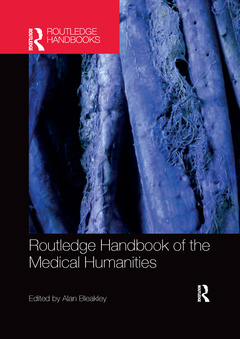Routledge Handbook of the Medical Humanities
Coordonnateur : Alan Bleakley

This authoritative new handbook offers a comprehensive and cutting-edge overview of the state of the medical humanities globally, showing how clinically oriented medical humanities, the critical study of medicine as a global historical and cultural phenomenon, and medicine as a force for cultural change can inform each other.
Composed of eight parts, the Routledge Handbook of the Medical Humanities looks at the medical humanities as:
- a network and system
- therapeutic
- provocation
- forms of resistance
- a way of reconceptualising the medical curriculum
- concerned with performance and narrative
- mediated by artists as diagnosticians of culture through public engagement.
This book describes how the medical humanities can be used in and out of clinical settings, acting as a point of resistance, redistributing medicine?s capital amongst its stakeholders, embracing the complexity of medical instances, shaping medical education, promoting interdisciplinary understandings and recognising an identity for the medical humanities as a network effect. This book is an essential read for all students, scholars and practitioners with an interest in the medical humanities.
Introduction Medical humanities as networks, systems and translations 1 A Dose of Empathy from my Syrian Doctor 2 The Cultural Crossings of Care: A Call for Translational Medical Humanities 3 Medical Work in Transition: Toward Collaborative and Transformative Expertise 4 Health, Health Care and Health Education: Problems, Paradigms, and Patterns Democratising medicine: the medical humanities as forms of resistance 5 The State of the Union: Rigour and Responsibility in US Health Humanities 6 The Cutting Edge: Health Humanities for Equity and Social Justice 7 Geography as Engaged Medical-Health-Humanities 8 Challenging Heteronormativity in Medicine 9 Medical Nemesis 40 Years On: The Enduring Legacy of Ivan Illich 10 Hospitaland Medicine’s metaphors and rhetoric 11 Don’t Breathe a Word: A Psychoanalysis of Medicine’s Inflations 12 Metaphor as Art – A Thought Experiment 13 The Practice of Metaphor 14 Medical Slang: Symptom or Solution? 15 Ageism and Rhetoric 16 The Rhetorical Possibilities of a Multi-metaphorical View of Clinical Supervision 17 Narratives of Anti-Vaccination 18 Thought Curfew: Empathy’s Endgame? Medicine as performance and public engagement 19 The Performing Arts in Medicine and Medical Education 20 A Manifesto for Artists’ Books & the Medical Humanities 21 Grasping Emergency Care through Pop Culture: The Truths and Lies of Film, Television and Other Video Based Media 22 Who is the Audience for Medical/ Health Humanities? 23 Desire Imagination Action: Theatre of the Oppressed in Medical Education 24 Zombie Sickness: Contagious Ideas in Performance 25 The Masks of Uncertainty Embodiment and disembodiment 26 Nobody’s Home 27 Ecstasy 28 Relationships that Matter: Embodying Absent Kinships in the Japanese Child Welfare System 29 Still Alice? Ethical Aspects of Conceptualising Selfhood in Dementia 30 Body Maps: Reframing Embodied Experiences through Ethnography and Art 31 Perspectives on Olfaction in Medical Culture The medical humanities in medical education 32 The ‘Awe-full’ Fascination of Pathology 33 Balancing Bioethics by Sensing the Aesthetic 34 Medical Humanities Online: Experiences from South Africa 35 “Your effort was great/ You carried me nine months”: The Birth of Medical Humanities in Ethiopia Part I: ‘Your effort was great’ Part II: Spices and Hard Questions 36 Medical Humanities in Canadian Medical Schools: Progress, Challenges and Opportunities The patient will see you now 37 Can We Make Empathy More Intelligent? Try Social Empathy! 38 A Letter from Marijke Boucherie to Alan Bleakley 39 Health Humanities: A Democratising Future Beyond Medical Humanities 40 Doctors Need Safe Confessional and Cathartic Spaces. What We Learned From the Research Project: ‘People Talking: Digital Dialogues for Mutual Recovery’ 41 All Thanks to the Words of a Stranger (an homage to the UK’s National Health Service) Overview: celebrating the Persian Flaw 42 Negotiating Research in the Medical Humanities
Alan Bleakley is Emeritus Professor of Medical Education and Medical Humanities at Plymouth University’s Peninsula School of Medicine, UK, and Visiting Scholar at the Wilson Centre, University of Toronto, Canada. He is immediate past president of the Association for Medical Humanities Council.
Date de parution : 06-2022
17.4x24.6 cm
Date de parution : 08-2019
17.4x24.6 cm
Thèmes de Routledge Handbook of the Medical Humanities :
Mots-clés :
Young Man; LGBTQ Patient; critical medical humanities; Vincent Van Gogh; humane medicine; LGBTQ Health; medical education; Vaccine Hesitancy; medicine; Public Engagement; medical humanities; Melaka Manipal Medical College; historical phenomenon; cultural phenomenon; Vice Versa; cultural change; Human Suffering; Canadian Medical Schools; UK National Health Service; Zombie Apocalypse; Base Jumper; Base Jump; CBME; MMR Jab; Blueberry Muffin Baby; Biomedical Ethics; LGBTQ People; Clinical Supervision; Chaos Narrative; LGBQ People; Medical Nemesis; Metastatic Small Cell Lung Cancer



